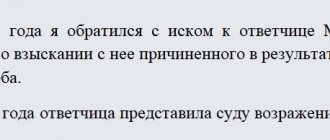Types of procedural deadlines
Procedural deadlines in civil law are periods of time during which a claim, complaint, statement or other similar procedural action is filed.
Moreover, they can be defined as general and special. So, depending on who set them, the general deadlines can be divided into:
- Regulatory.
- Negotiable.
- Judicial.
By purpose they are of the following categories:
- Generative rights of a citizen - for example, acquisitive prescription, that is, when an individual who is not the owner of property acquires ownership of it.
- Protection established by art. 8 of the Civil Code of the Russian Federation of civil rights - limitation period.
- Fulfillment of duties - according to the contract, agreement of the parties.
- Exercising rights.
Moreover, the procedural time limits for the exercise of rights applied in civil proceedings are the period when an authorized person has the right to exercise his civil right himself or an obligated person can do so. This includes special procedural deadlines:
- preemptive - affect the existence of subjective civil law (for example, the right of an heir to enter into an inheritance within six months from the date of its opening, Article 1154 of the Civil Code of the Russian Federation);
- claims - so, during such a period, the client has the right to submit a written claim to the transport company regarding the fulfillment of the requirements arising from the cargo transportation contract.
Site Expert
Fasakhovva Elena Alexandrovna
Member of the Russian State Duma Committee on Non-Bank Credit Institutions. Has been involved in bankruptcy proceedings since 2015.
Ask a Question
When claims deadlines are applied, pre-trial dispute resolution is carried out. If the client’s demands are not satisfied at this time, then filing a claim in court is considered justified.
Regulatory
Regulatory procedural deadlines can only be established by law or other regulatory legal act. For example, they are applied under the articles of the Civil Code of the Russian Federation:
- 21 of the Civil Code of the Russian Federation - on the legal capacity of an individual;
- 42 of the Civil Code of the Russian Federation - on recognizing an individual as missing;
- 196 of the Civil Code of the Russian Federation - on the limitation period.
There are 2 types of regulatory procedural deadlines:
- Mandatory - for example, limitation period, period of validity of patent (copyright) rights, etc.
- Dispositive.
Unless otherwise established by the parties to the agreement, discretionary regulatory deadlines are established. Thus, a trust agreement for the management of real estate/movable property can be drawn up for a maximum period of 5 years. However, the parties may specify a different time for execution of the contract. However, it must be limited to the specified 5-year period.
Negotiated
Procedural deadlines can also be negotiated. In other words, they are fixed by agreement of the parties. So, it could be a 5 year hire. In this case, a rental agreement is drawn up.
Judicial
Judicial deadlines also include procedural deadlines. They are established by a separate court decision (for example, on the basis of Article 204 of the Code of Civil Procedure of the Russian Federation).
What period is considered reasonable in civil law?
In Art. 6.1 of the Code of Civil Procedure of the Russian Federation establishes such a concept as a reasonable period of legal proceedings in civil proceedings. It includes the period calculated from the date the claim was received by the office of the court of 1st instance until the date the judge issued the last decision on the case.
In other cases, in civil law the deadline for fulfilling the obligation may be reasonable. Thus, its duration is 7 days from the date the creditor (bank) submits a demand for payment of the debt (Article 314 of the Civil Code of the Russian Federation).
A reasonable period may be applied, in particular, under the following articles of the Civil Code of the Russian Federation:
- 157.1 of the Civil Code of the Russian Federation - consent to the transaction;
- 345 of the Civil Code of the Russian Federation - pledge;
- 367 of the Civil Code of the Russian Federation - surety.
- 386 of the Civil Code of the Russian Federation - the debtor’s objections to the new creditor’s demand for debt collection;
- 415 of the Civil Code of the Russian Federation - debt forgiveness; 470 of the Civil Code of the Russian Federation - guarantee;
- 477 of the Civil Code of the Russian Federation - detection of defects in the transferred goods;
- 619 of the Civil Code of the Russian Federation - early termination of the contract at the request of the lessor.
However, the legal term “principle of reasonableness” is evaluative. Moreover, it can be used differently in each situation, depending on (Article 6.1 of the Code of Civil Procedure of the Russian Federation):
- The nature of the circumstances.
- The complexity of the matter.
- Conduct of participants in court proceedings.
- The efficiency of the court.
- The total duration of the trial.
The courts also agree with this. Judicial practice is presented in the Determination of the Voronezh Regional Court dated July 17, 2018 in case No. 33-4970/2018 and the Sverdlovsk Regional Court dated November 20, 2018 in case No. 33-19917/2018.
The concept of a reasonable time in legal proceedings
The concept of “reasonable time for legal proceedings” is present in civil (Article 6.1 of the Code of Civil Procedure of the Russian Federation), arbitration (Article 6.1 of the Arbitration Procedure Code of the Russian Federation), criminal (Article 6.1 of the Code of Criminal Procedure of the Russian Federation), administrative (Article 10 of the CAS) process. Moreover, to protect the constitutional right of citizens to a reasonable period of trial, a special Federal Law dated April 30, 2010 No. 68-FZ “On compensation for violation of the right to trial within a reasonable time or the right to execution of a judicial act within a reasonable time” was adopted. However, none of these acts defines a period that can be considered reasonable, but only reflects the criteria for determining “reasonableness” developed by the practice of the European Court of Human Rights (hereinafter referred to as the ECHR): legal and factual complexity of the case, behavior of the participants in the process, sufficiency and the effectiveness of the court's actions carried out for the purpose of timely consideration of the case, and the overall duration of the proceedings in the case.
However, let us turn to the history of the said law and articles of procedural legislation. They were not adopted by chance, but became the reaction of the Russian Federation to the landmark Resolution of the ECHR in the case “Burdov v. the Russian Federation”[1] No. 2 (Complaint No. 33509/04), adopted on January 15, 2009. The operative part of the Resolution stated, in particular: “the authorities The respondent states are obliged to introduce within 6 months from the date of entry into force of this Resolution in accordance with paragraph 2 of Art. 44 of the Convention [for the Protection of Human Rights and Fundamental Freedoms] an effective domestic remedy or combination of such remedies which will provide adequate and sufficient redress for non-enforcement or late execution of decisions of national courts, taking into account the Convention principles established in the case-law of the European Court "
The Constitutional Court of the Russian Federation (hereinafter referred to as the Constitutional Court) in its ruling dated July 3, 2008 No. 734-O-P “On the complaint of citizen V. about the violation of her constitutional rights, Art. 151 of the Civil Code of the Russian Federation” reflected, among other things, the position of the ECHR, mentioning, in particular, an earlier ruling in the case “Burdov v. RF”, issued on May 7, 2002. The Constitutional Court emphasized that Art. 151 of the Civil Code of the Russian Federation does not prevent the adoption of a decision on monetary compensation in cases of non-execution of court decisions on claims against the Russian Federation, its constituent entities or municipalities, however, “this does not relieve the federal legislator of the obligation - based on the Constitution of the Russian Federation and taking into account this Determination - as soon as possible establish criteria and a procedure ensuring the award of compensation for non-execution of decisions on claims against the Russian Federation, its constituent entities or municipalities, in accordance with international legal standards recognized by the Russian Federation.”
Thus, the adoption of a number of judicial acts on issues of excessive time limits for judicial proceedings by the ECHR, and, finally, the reaction of the Constitutional Court of the Russian Federation served as a necessary catalyst for the introduction of relevant norms into Russian procedural legislation. After their introduction, Russian courts received a flood of relevant applications demanding compensation for violation of reasonable deadlines. And here we are faced with the central problem of the legal category under consideration.
It would seem that what could be clearer than the requirements of rationality and common sense? But, as practice shows, not everything is so simple, because the very concept of “reasonable time” and those criteria that migrated into Russian legislation from judicial practice are undoubtedly exclusively evaluative. Thus, the plaintiff believes that his case is simple, but the judge (from a professional point of view!) assesses the case as complex, requiring increased attention and the development of a clear position on all legal issues raised during the trial. The plaintiff may believe that the parties' conduct satisfies any standard (from procedural to ethical), and the court's actions are not sufficient and effective for optimal consideration and resolution of the case. Obviously, the court's position on these issues may be exactly the opposite. From all this we can conclude that any dispute arising from requirements for a reasonable period will be reduced only to unfounded value judgments of the parties and the court.
One way to get out of the described impasse is to return to the usual order. For example, when considering a certain case, a party files a complaint about a violation of its right to trial within a reasonable time; The court considering the complaint takes into account the circumstances of the case in which, in the opinion of the applicant, his right was violated, and looks for processes similar to this case in judicial practice. If complaints about violation of the right to trial within a reasonable time were not filed in the analogues found by the court, then this practice is generalized, and the average period of trial is accepted as normal and usual in such cases.
Also, as one would expect, a proposal appeared to establish strict procedural deadlines, establish a maximum number of extensions of deadlines and postponement of court hearings. This proposal is valuable in that it allows us to look at the problem ad absurdum, to return to the root causes of why evaluative categories are needed in law, and the judge cannot be replaced by an automaton who resolves legal issues by choosing a norm based on the similarity of the norm and a specific legal composition. Universalism and rigidity in the legal (including civil) process are unacceptable, since they do not allow taking into account the entire possible variety of circumstances and situations.
Let us make a reservation that the conclusions presented in the two previous paragraphs are equally applicable not only to legal proceedings, but also to the execution of judicial acts. At the same time, I would like to emphasize that the execution of judicial acts would be more effective if the bailiff service were directly subordinate to the courts. Perhaps the structure of the executive authorities looks quite well thought out in the form it currently has, but it is our deep conviction that if someone makes decisions, then they must also be endowed with the ability to execute them. Judges in no way can have a real impact on the execution of their decisions. If the executor – the FSSP – is subordinated directly to the court, then the latter’s ability to influence the course of execution of judicial acts will certainly increase. In addition, needless to say that bailiffs must be geographically located at the court and execute the decisions of the court at which they are located. In other words, the system should be built with maximum convenience for the person seeking protection of his rights.
Returning to the practice of the ECHR, it is impossible not to note the decisions published on April 17, 2012 in the cases “Ilyushkin and Others v. Russia” (complaints NN 5734/08, etc.) and “Kalinkin and others v. Russia” (Kalinkin and Others v. Russia). Others v. Russia, complaints NN 16967/10, etc.), with which the ECtHR directly concluded that the Federal Law “On compensation for violation of the right to trial within a reasonable time or the right to execution of a judicial act within a reasonable time” dated April 30, 2010 No. 68- The Federal Law does not create the necessary effective remedy, since it allows one to obtain compensation for violation of the right to execution only of a “judicial act providing for the levy of execution on funds from the budgets of the budgetary system of the Russian Federation,” but not other judicial acts that the state is obliged to execute “in kind.” Thus, there is a continuation of the well-known practice of execution by the state of decisions of the ECHR, and directly of Russian courts: compensation is paid regularly, but if we are talking about actions such as repairing dilapidated housing, providing social benefits, banning or permitting any activity, execution is delayed, and attempts to force execution do not have the desired result.
Among other things, it is worth especially noting the ECtHR’s statement that the interpretation of 68-FZ by the Supreme Court of the Russian Federation, given by it when considering the cases of a number of applicants, indicates that the applicants - like other persons in a similar situation - are deprived of internal remedies . The ECHR, in particular, directly referred to the joint Resolution of the Plenums of the Supreme Court and the Supreme Arbitration Court of the Russian Federation No. 30/64 of December 23, 2010 “On some issues arising when considering cases of awarding compensation for violation of the right to trial within a reasonable time and the right to execute a judicial act within reasonable time."
So, it is quite obvious that the rule on reasonable time limits for legal proceedings and execution of judicial acts “does not work” properly. A systematic analysis of the problem suggests that the reasons for the dysfunctionality of the norm lie not only in the field of legal proceedings and the execution of judicial acts - one cannot blame only judges and bailiffs for everything, although, of course, it is precisely because of their poor work that cases are considered and court decisions are executed for years. The root of evil lies at the foundation of the entire Russian reality - total irresponsibility, coupled with the vagueness and overlap of powers, allows any body or official to “disown” the implementation of any task, shift it to another, and even simpler - redirect citizens and representatives of legal entities from one office places to another until they realize the futility of trying to make a dead horse gallop.
[1] https://hudoc.echr.coe.int/sites/eng/pages/search.aspx?i=001-90671
Determining the deadlines for appeal
Procedural deadlines also include appeal deadlines. They are as follows:
- 1 month from the date of registration by the court of the first instance of the decision in the final wording (form) - for court decisions that have not yet entered into force (Articles 320, 321 of the Code of Civil Procedure of the Russian Federation);
- 15 days from the date of registration - according to the rulings adopted by the court of 1st instance (Articles 331, 332 of the Code of Civil Procedure of the Russian Federation);
- 3 months from the moment when the appealed judicial act came into force - according to acts of courts (magistrate, district), if the court order, ruling or decision has already entered into force (Article 376, 376.1 of the Code of Civil Procedure of the Russian Federation);
- 3 months from the date of discovery (occurrence) of circumstances - according to acts of courts that are subject to revision due to new circumstances or newly discovered ones (Article 394 of the Code of Civil Procedure of the Russian Federation).
Moreover, it is important to know on which day of the appeal period you can file a complaint.
How to determine the beginning of a period
In civil proceedings, the procedural period begins to count on the day following the occurrence or day of the event. In arbitration proceedings, it begins to be calculated on the day following the calendar day of the event or the date of its occurrence, and in criminal proceedings, for example, when a criminal is detained, from the moment of his actual detention.
As a result, in accordance with the Code of Civil Procedure of the Russian Federation, the deadline for appeal begins to count the next day after the judge makes one of two decisions - a final version or a reasoned one. This is stated in Art. 321, 107, 199 Code of Civil Procedure of the Russian Federation. In addition, the judges of the Supreme Court of the Russian Federation agree with this.
Example! The court decision was made in its final version on February 27, 2021. Then you can file an appeal against such a decision as early as February 28, 2021, that is, the next day (Determination of the Civil Cases Collegium of the Armed Forces of the Russian Federation No. 4-KG17-85 dated February 20, 2021 ).
How to calculate expiration date
According to the law, the day of expiration of the procedural period directly depends on its duration. So, it expires:
- if it is equal to several years - on the day and month of the last year of appeal;
- if monthly (several months) - on a certain date of the last month.
Moreover, if the procedural period ends on a Saturday, Sunday, holiday or other non-working day, then its end date is the new working day following the non-working day. In addition, the complaint can be filed before 24 hours of the deadline for appeal or before the end of the working day in court. If you contact the post office, the complaint must be submitted here before midnight.
Example! The court decision was finalized on February 27, 2021. An appeal against such a decision can be filed the next day, that is, on February 28, 2021. In this case, 1 month is given for the appeal. (Articles 320, 321 of the Code of Civil Procedure of the Russian Federation). As a result, you can file a complaint until March 27, 2021 inclusive (Determination of the Supreme Court of the Russian Federation No. 4-KG17-85 of February 20, 2021).
The Constitutional Court broke the judges' ideas about reasonable time limits for legal proceedings
Collage: Legal.Report The Constitutional Court of the Russian Federation, by its resolution, obliged the legislator to amend the Criminal Procedure Code aimed at clarifying the procedure for determining for victims of crimes the moment when the reasonable period of criminal proceedings begins to be calculated. The reason was the complaint of the applicant who tragically lost her children, to whom the courts refused compensation, in fact referring to their own practice.
The Constitutional Court considered without holding a hearing the case on the complaint of Astrakhan resident Elvira Yurovskikh, who challenged the constitutionality of Part 3 of Art. 6.1 of the Code of Criminal Procedure of the Russian Federation (reasonable period of criminal proceedings). In 2012, a woman pregnant with triplets lost two children during a planned operation in the maternity hospital. However, the criminal case under Part 1 of Art. 293 of the Criminal Code of the Russian Federation (negligence) was initiated by the Investigative Committee only two years later. Yurovskikh and her surviving daughter, who suffered serious harm to her health, were recognized as victims. In 2021, the case was closed due to the death of the suspect.
Yurovskaya filed an administrative claim against the Russian Ministry of Finance. She demanded to recover 1 million rubles in favor of herself and her daughter as compensation for violation of the right to criminal proceedings within a reasonable time. The Astrakhan Regional Court and the Appellate Division of the same court rejected the claim. While recognizing the duration of the proceedings as reasonable, the courts proceeded from the fact that the duration of the proceedings should be calculated from the day the Yurovskikhs and her daughter were recognized as victims and until the day the decision was made to terminate the criminal proceedings. When the transfer of the Yurovskys' cassation appeals was refused, she appealed to the Constitutional Court.
The Constitutional Court, considering the case, among other things, referred to the conclusions from Resolution No. 23-P of June 13, 2021, which considered the issue of determining the duration of a reasonable period of trial for cases with a guilty verdict (the Ministry of Justice, in accordance with the legal position of the Constitutional Court, developed draft amendments to the Code of Criminal Procedure In December last year, the document was submitted to the State Duma for consideration).
The Constitutional Court emphasized that the victim must be provided with real judicial protection in the form of restoration of the rights and freedoms violated by the crime. Including legal proceedings within a reasonable period of time - from the date of filing an application for a crime until the initiation of a criminal case and the issuance of a decision recognizing a person as a victim.
However, the contested norm, both in its literal meaning and in the meaning given to it by judicial practice, allows us to exclude from the assessment of the reasonableness of the period of criminal proceedings the duration of the stage of initiation of a given case, when the case is terminated due to the death of the suspect. This, as the Constitutional Court pointed out, leads to a violation of the constitutional rights of the person who has been harmed by the crime.
The Constitutional Court decided to recognize Part 3 of Art. 6.1 of the Code of Criminal Procedure of the Russian Federation does not comply with the Constitution to the extent that it allows, when determining a reasonable period of criminal proceedings for a person to whom physical, property, or moral harm has been caused by a crime (recognized in the prescribed manner as a victim), not to take into account the period from the day he filed a statement of crime and until the initiation of a criminal case about this crime in cases where the proceedings on this criminal case are terminated due to the death of the suspect. The federal legislator is ordered to make appropriate changes to the criminal procedure law. Court decisions against the Yurovskys are subject to review in accordance with the established procedure.
Procedure for restoring a missed deadline
It happens that the applicant missed the procedural deadline. However, it can be restored upon an appropriate application (petition) to the court.
However, this can only be done for reasons recognized by the judge as valid. So, it could be a serious illness, helplessness or illiteracy.
In particular, the deadlines for filing an appeal or filing a private complaint against a court ruling may be restored.
The applicant's procedure is as follows:
- Drawing up a petition for reinstatement.
- Filing a petition to the court.
- Filing a claim, statement, complaint or other action that was missed (for example, filing an application for reimbursement of legal expenses).
- Receiving notice of the place and date of the court hearing.
- Taking part in legal proceedings. However, in case of failure to appear, the decision on reinstatement may be made in absentia.
- Receiving a court ruling on restoration or refusal thereof. Moreover, the court’s refusal can be appealed within 15 days.
If the deadline for filing a cassation or supervisory appeal with the court is missed, the petition for its restoration is considered by the judge in the manner prescribed by Art. 376.1, 390.3, 391.2, 391.11 Code of Civil Procedure of the Russian Federation. Moreover, this is possible if the court found the reason for absence to be valid and it arose within 1 year from the date when the appealed court decision came into force.
Articles:
Limitation period in civil law - how to calculate correctly
Limitation period for canceling a court order for debt collection





